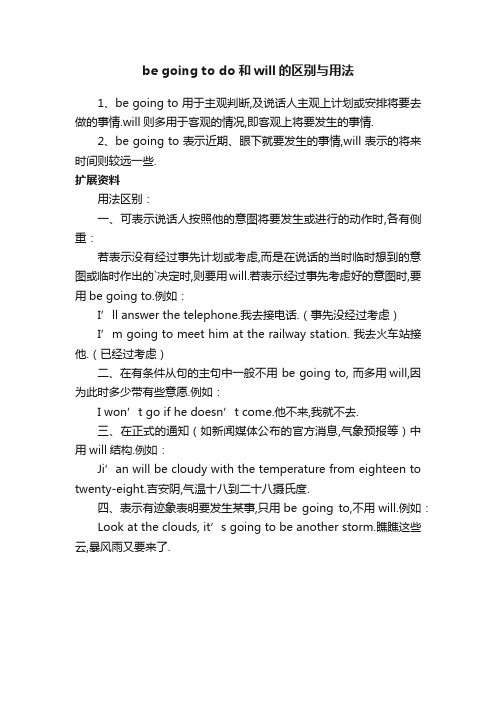begoingto结构以及与will区别以及练习
一般将来时begoingto与will的解析和练习

练习4: 完形填空
The party (1) at 8 pm tomorrow. We (2) many things to prepare. First, we (3) some food and drinks. Then we (4) the furniture and (5) some music. We hope you can join us!
使用正确的动词和时间状语。
练习8: 用一般将来时回答问题
使用正确的动词形式描述将发生的事情。
一般将来时中的日常口语表达
常用短语
1. I am going to… (我打算… ) 2. She will probably… (她可能会… ) 3. He will most likely… (他很可能会… )
一般将来时 bgoingto 与 will 的解析和练习
一般将来时是英语中最常用的时态之一,它用来描述将要发生的事情或预测 未来。本文将讨论一般将来时的两种构成方式:be going to 和 will。我们将 解析它们的用法,区别,在多种情景中的应用,并提供丰富的练习来帮助你 熟练掌握这种时态。
一般将来时的概述
时间状语从句的使用方法
时间状语从句用于描述一种更具体的时间或日期,并且通常以连词“when”或 “while”开始。
其他表示未来的形式
除了一般将来时,还有许多其他描述未来的语法形式,如进行时将来时和完 成时将来时。
一般将来时中的动词时态
动词时态用于描述正在进行的动作,是否完成或是否在将来进行。未来进行时态,将来完成时态和现在 完成进行时态均用于将来某个时刻或动作的描述。
练习3: 改变句子的时态
练习1
改写下面的句子,用将来进行 时: "I will be studying English tomorrow."
begoingtodo和will的区别与用法

be going to do和will的区别与用法
1、be going to 用于主观判断,及说话人主观上计划或安排将要去做的事情.will则多用于客观的情况,即客观上将要发生的事情.
2、be going to 表示近期、眼下就要发生的事情,will 表示的将来时间则较远一些.
扩展资料
用法区别:
一、可表示说话人按照他的意图将要发生或进行的动作时,各有侧重:
若表示没有经过事先计划或考虑,而是在说话的当时临时想到的意图或临时作出的`决定时,则要用will.若表示经过事先考虑好的意图时,要用be going to.例如:
I’ll answer the telephone.我去接电话.(事先没经过考虑)
I’m going to meet him at the railway station. 我去火车站接他.(已经过考虑)
二、在有条件从句的主句中一般不用 be going to, 而多用will,因为此时多少带有些意愿.例如:
I won’t go if he doesn’t come.他不来,我就不去.
三、在正式的通知(如新闻媒体公布的官方消息,气象预报等)中用will结构.例如:
Ji’an will be cloudy with the temperature from eighteen to twenty-eight.吉安阴,气温十八到二十八摄氏度.
四、表示有迹象表明要发生某事,只用be going to,不用will.例如:
Look at the clouds, it’s going to be another storm.瞧瞧这些云,暴风雨又要来了.。
一般将来时be-going-to-与will解析和练习备课讲稿-2023年学习资料

四、there be句型的一般将来时-1.There is/are going to be-知:There is going to be a sports meeting at-our school next we k,-一般疑问式:-Is there going to be a sports meeting at-ou school next week?-回答:-Yes,there is./No,there isn't-否 句式:-There isn't going to be a sports meeting at-our s hool next week.
四、使用be going to应注意的两点-1.there be句型中going to后面的be不能改为ave-例如:-There is going to be a football match next-Sa urday in our school.-下周六我们学校将有一场足球比赛。e,go,leave arrive等表示位置移动的动-词常用现在进行时表示将要发生的动作,它-们很少与be going to结构 用。例如:-Miss Sun is coming tonight.-今晚孙小姐要来。
殷将来时的构成:-1.be going to+动词原-形-2.助动词W山+动词原形-动词原形包指动词be和 为动词原形
一、be going to的用法点拨-be going to是一种固定结构,后面接动词原-形,用来表示按计 或安排要发生的动作,-有时也可以表示推测将要或肯定会发生的-动作,有“准备;打算”的意思。含有be-goi g to结构的句子中往往有表示将来的时-间状语。例如:-We are going to have a cl ss meeting this-afternoon.-今天下午我们打算开班会。-Look at the b ack clouds.It's going to rain.-看那些乌云,快要下雨了。(推测
begoingto和will的区别

be going to与will的区别be going to与will两者都可表示将要发生的事、将要去做某事,但它们有如下几点区别:1. be going to 表示近期、眼下就要发生的事情,will 表示的将来时间则较远一些,如:He is going to write a letter tonight. He will write a book one day.2. be going to 表示根据主观判断将来肯定发生的事情,will表示客观上将来势必发生的事情。
He is seriously ill. He is going to die. He will be twenty y ears old.3. be going to含有“计划,准备”的意思,而will则没有这个意思,如: She is going to lend us her book. He will be here i n half an hour.4.在有条件从句的主句中,一般不用 be going to, 而多用will, 如: If any beasts come at you, I'll stay with you an d help youwill与be going to的选用原则1. 关于“打算”原先作好的打算用“be going to”。
“Kate is in hospital.”“Yes, I know. I am going to seeher this afternoon.”“凯特在住院。
”“是的,我知道。
我下午要去看她。
”说话时即时的打算用“will”。
“Kate is in hospital.”“Oh, really, I didn’t know. I will go and see her at once.”“凯特在住院。
”“哦,是吗?我都不知道呢。
我得马上去看她。
”2. 关于“预料”在有迹象表明的情况下的预料用“be going to”Look at the clouds. It’s going to rain. 你看天上的云。
Be going to的用法与练习

Be going to的用法与练习正文:XXX 句型的用法Be going to 句型有两种不同的用法。
第一种用法是表示将要发生的动作或存在的状态,例如:I’m going to the school。
我正要去学校。
在这种情况下,to 后面需要加上名词。
第二种用法是表示打算、计划或准备做某事,例如:I’m going to go to the school。
我打算去学校。
在这种情况下,to 后面需要加上动词原形。
一般将来时一般将来时用于表示将要发生的动作或存在的状态,以及打算、计划或准备做某事。
句中通常会有时间状语,如:tomorrow。
next day(week。
month。
year…)。
soon。
the day after tomorrow(后天)等。
它有两种基本结构:①be going to + do;②will + do。
Be going to 的特殊疑问句形式构成特殊疑问句的方式是:疑问词 + be going to 的一般疑问句。
可以用以下口诀来记忆:疑问词在句首,系动词 be 跟着走,主语、going 紧相随,其它成分不要丢。
要把陈述句形式转换成特殊疑问句形式,可以采用一定、二变、三去掉的方法。
即:确定疑问词,把 be going to 变为一般疑问句形式,去掉划线部分。
例如:We are going to have a XXX。
确定疑问词为 when(什么时候),把原句改为一般疑问句 are you goingto have a meeting next Monday。
然后去掉划线部分,即 When are you going to have a meeting。
你们打算什么时候开会?需要注意的是,如果要对 to 后面的动词短语进行提问,则需要使用 What。
do。
对于例句中的 have a meeting 进行提问,应该是:What are you going to do next Monday。
be going to 与will

1. 用be going to 表示:be going to 相当于一个助动词,与其后的动词原形一起构成句子的谓语,表示近期将要发生的动作或存在的状态。
如:I'm going to see a film this afternoon. 今天下午我想去看电影。
①“ be going to +动词原形”表示主观上打算在将来某个时间要做某事。
如:Her mother is going to buy her a new bike. 她妈妈要给她买辆新自行车。
②“ be going to+动词原形”还可以表示说话人根据已有的迹象认为将要发生的事。
如:It's going to rain. 快要下雨了。
be going to和will/shall+do的区别:be going to表示“想要做什么”,有计划要做什么的含义。
而will/shall+do表示“将会”。
说明某动作肯定会发生。
如:I'm going to finish my homework.我想把作业明天完成。
(计划)I will finish my homework.明天我会完成作业。
(没有任何疑问,肯定能发生)再如:I will rain tomorrow.明天会下雨。
(表示肯定,因为是天气预报说的)will用来表示将要发生的动作be going to 在口语中表示决定或安排好的事,也用来表示自然现象be doing 安排好的事,很少变更三者所表示的事情发生的可能性:will最小,be doing 最大,be going to 居中I. "will (shall)+动词原形"表示将来某个时间将要发生的动作或存在的状态。
will 用于各种人称,shall只用于第一人称。
在否定句中will not常缩写为won't,shall not可缩写为shan't。
它们的使用场合是:(1) 表示将来某个时间要做的事,常与一般将来时的时间状语连用,如tomorrow, next week(month), in three hours(三小时以后)等。
will和begoingto的用法

will和begoingto的用法will引导的一般将来时,表示将来发生的动作或存在的状态,其结构是“will+动词原形”。
be going to表一般将来时,其结构是“be going to+动词原形”,含有该结构的句子中往往有表示将来的时间状语,如tomorrow,next week等。
Will引导一般将来时1.“主谓(宾)”句型的一般将来时:(1)肯定句:主语+will+动词原形+(宾语)+其他Some day people will go to the moon.总有一天人们会去月球。
(2)否定句:在will后加not即可。
Will not可缩写为won’t。
They won’t use books.他们将不再使用书。
(3)一般疑问句:把will提到句子主语之前,结尾变问号。
Will students go to school in the future?将来学生还去学校吗?(4)特殊疑问句:特殊疑问词+will+主语+动词原形+其他?What will your dream school have?你理想中的学校有什么?2.“There be”句型的一般将来时(1)肯定句:There will be+名词+其他(无论后面加单数或复数形式,be都必须用原形)There will be only one country.将来只会有一个国家。
(2)否定句:在will后面加notThere won’t be only one country.(3)一般疑问句:把will提到there之前。
Will there be only one country?Yes,there will./No,there won’t.3.表示将来某一时刻的动作或状态:We will come to see you the day after tomorrow.There will be a wonderful show next week.4.表示将来某一段时间内经常的动作或状态:The students will come and work in the lab once a week.We will come and work in this factory every year.be going to表一般将来时1.概念(1)表示主语的意图,即主语计划或打算要做的事。
will和be going to的区别

Be going to 结构和will的比较 1,一般情况下will 可以和be going to 互换。 Be going to 表示打算,意图。 We are going to /will meet in the park at 5 pm. 2.以下情况多用will而不用be going to 侧重于说话人相信或希望要发生某事,可指 遥远的将来 I believe he will become a famous actor. 陈述自然规律,表示单纯的将来事实 This year she is 17 and next year she’ll be 18 带有主观意愿色彩。 If you like,I’ll do it for you .如果你喜欢,我会 为你做那件事的
- 1、下载文档前请自行甄别文档内容的完整性,平台不提供额外的编辑、内容补充、找答案等附加服务。
- 2、"仅部分预览"的文档,不可在线预览部分如存在完整性等问题,可反馈申请退款(可完整预览的文档不适用该条件!)。
- 3、如文档侵犯您的权益,请联系客服反馈,我们会尽快为您处理(人工客服工作时间:9:00-18:30)。
2017.11.26“ be going to 结构一、“ be goi ng to表示将要发生的事或打算、计划、安排要做的事。
它是一般将来时的一种表达形式,其后常有表示将来的时间状语。
女口:tomorrow, next week 等。
例如:We are going to play football tomorrow. 明天我们将去踢足球。
二、构成:be going to +动词原形。
在be going to结构中,be随主语人称和数的变化而变化, 而going to 固定不变。
例如:clea n the classroom tomorrow.He is going toThey are going to clean the classroom tomorrow.三、句式变化:be going to结构的句式变化都可在be上完成。
变疑问句时,将be提至主语之前;变否定句在be后加not。
例如:They are not going to have a picnic next week.下星期他们将不去野餐。
Are they going to have a picnic next week?下星期他们将去野餐吗?What are they going to do n ext week?下星期他们打算干什么?四、“be going to动词原形”的用法。
1. 表示主语打算、安排在最近或将来要做某事或出现的某种状态。
这种主观意图,一般已做过事先安排,故其实现的可能性较大,其主语常是人。
例如:We are going to swim n ext Sun day.下星期天我们打算去游泳。
(已打算好下星期天去游泳)2. 表示根据现有情况、某种迹象,判断将要或即将发生的动作。
此时不含有主观意图,只是表示说话人对客观事态发展的判断或推测,此时主语可以是人,也可以是物。
例如:Look! It ' s g otn rain.看!天要下雨了。
(可能根据天气闷热、雷声隆隆等迹象判断天要下雨)I ' m not feeling well, I ' m going to be ill.我感觉不是很好,可能要生病了。
(仅表示说话人的一种感觉而已)3. 若“be going to动词原形”这一结构中的动词是go时,此时动词go可以省去。
例如:They are going to (go to )the park next Friday.下星期五他们打算去公园。
4. “ be going to +动词原形”结构与表示将来的时间状语是否连用,在意思上有所差别。
如果其后有明确的时间状语,则表示该动作或状态发生的可能性较大;反之,则表示一种推测,表示未来可能发生的事情。
例如:There is going to be a film in our school this evening. 今晚我们学校将有一场电影。
(一定会发生) Hurry up! We are going to be late.快点!我们要迟到了。
(仅表示一种推测)词语辨析be going to, will 二者均可用来表示将来某个时候发生的动作或存在的状态,但在实际运用中它们是有区别的:A.be going to 通常指人们事先经过考虑、安排要做的事情,而will 则单纯表示将来,与主语在主观上没有任何关系。
例:1) We're not going to have any classes nest week下周我们将不上课。
(事先安排好的。
)2) There's someone at the door. I'll go and open it。
. 有人敲门,我要去开。
(并非事先安排而是临时决定的。
)B •如果说话人根据某种迹象推测将要发生的事,只能用be going to,而will多指说话人主观认为或者相信将会发生的事。
例:1) Look at those clouds! It's going to rain. 看那些云彩!要下雨了。
2) I think it will rain. 我认为要下雨了。
C. 若是表示不以人们的意志为转移的客观规律和普遍事实,必须用will ,而不用be going to 例:1 ) People won't live without water. 没有水,人就不会生存。
2) Tomorrow will be Thursday. 明天是星期四。
D. 在口语里问对方是否愿意做某事或表示客气的邀请和命令时,应用will,而不用be going to 例:1 ) Will you go with us? 你和我们一起去好吗?2) Will you not please close the door? 请你别把门关上好吗?E. 在含有条件状语从句的复合句里,如果表示主句的动作即将发生或状态即将存在,一般用will ,而不用be going to。
例:1) We'll go shopping if it doesn't rain tomorrow. 如果明天不下雨,我们就去买东西。
2) If you jump the queue, other people will not be pleased. 要是你不按次序排队,别的人会不高兴的。
[练习] 用be going to 和will 填空:1 . He _____ be thirty -five this time next year.2. __________ T h ey g et married next month.3. You ____ miss the early train if you don't go soon.4. ____ you help me with English?般将来时专项练习 、单项选择。
( ) 1. There _______ a meeting tomorrow afternoon.A. will be going toB. will going to beC. is going to beD. will go to be ( ) 2. Charlie ______ here next month.A. isn ' t workingB. doesn ' t workingC. isn 't going to workingD. won ' t work( ) 4. There ______ a dolphin show in the zoo tomorrow evening.A. wasB. is going to haveC. will haveD. is going to be()5. - _______ you ________ free tomorrow?-No. I _______ free the day after tomorrow. A. Are; going to; willB. Are; going to be; willC. Are; going to; will beD. Are; going to be; will be( ) 11. He ______ her a beautiful hat on her next birthday.A. givesB. gaveC. will givingD. is going to give( ) 13. He ______ in three days.A. coming backB. came backC. will come backD. is going to coming back ( ) 18. Tomorrow he ____________ a kite in the open air first, and then _________ boating in the park.A. will fly; will goB. will fly; goesC. is going to fly; will goesD. flies; will go( ) 19. The day after tomorrow they _____ a volleyball match.A. will watchingB. watchesC. is watchingD. are going to watch( ) 24. ______ your brother _______ a magazine from the library?( ) 30. The train _____ at 11.A. going to arriveB. will be arriveC. is going toD. is arriving二、动词填空。
1. I ____ ( l eave ) i n a minute. I __ (finish )all my work before I ______ (leave )2. —How long ____ you ___ (study )in our country?—I ____ (plan )to be here for about one more year.—I ____ (hope )to visit the other parts of your country.—What _____ you ____ (do )after you _____ (leave )here?—I ____ (return )home and _____ ( g et ) a job.3. I ____ (be )tired. I _____ (go )to bed early tonight.4. Mary ' s birthdiasynext Monday, her mother __ ( give ) her a present.5. It is very cold these days. It ___ ( snow ) soon.6. — _____ you __ ( be )here this Saturday?—No. I _____ ( visit ) my teacher.7. — _____ I ____ (get ) you a copy of today ' s newspaper?A. Are; going to borrowC. Will; borrows year. A. is going to beC. will be B. Is; going to borrowD. Are; going to borrows ( B. is going toD. will is ) 26. It the year of the horse next—Thank you.8. I am afraid there ____ (be) a meeting this afternoon. I can ' t join you.9. Mike ____ (believe, not)this until he _______ (see)it with his own eyes.10. Most of us don ' t think their team _(__w_i_n_). 三、句型转换。
